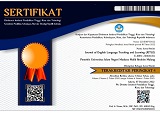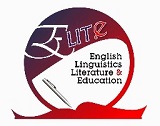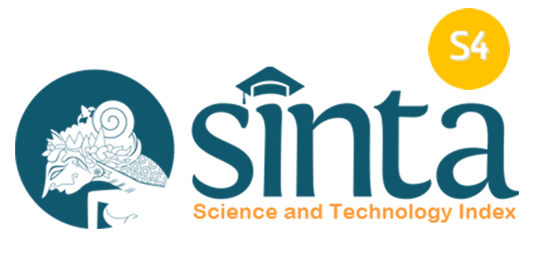Student’s Response in Online Learning Process: A Case Study of English Education Students
Abstract
Full Text:
PDFReferences
Abou El-Seoud, S., Seddiek, N., Taj-Eddin, I., Ghenghesh, P., Nosseir, A., & El-Khouly, M. (2014). E-Learning and Students’ Motivation: A Research Study on the Effect of E-Learning on Higher Education. International Journal of Emerging Technologies in Learning (IJET), 9(4), 20. https://doi.org/10.3991/ijet.v9i4.3465
Al-Mahrooqi, R., Denman, C. J., & Al-Hasani, F. (2017). A student perspective on the use of motivational strategies by their english language literature instructors in an omani university. Language and Culture, (9), 85–103. https://doi.org/10.17223/24109266/9/11
Anza, F., Luthfi, A., & Arfah, S. (2019). Introduction e-learning in educational sector case study Senior High School in DKI Jakarta. ASEAN Journal of Community Engagement, 3(1), 139–162. https://doi.org/10.7454/ajce.v3i1.149
Ary, D., Jacobs, L. C., & Razavieh, A. (2010). Introduction to research in education (8th ed). Belmont, CA: Wadsworth.
Bartley, S. J. (2004). Evaluating the Cost Effectiveness of Online and Face-to-Face Instruction. Educational Technology & Society, 7(45), 167–175.
Clover, I. (2017, February 17). Advantages and Disadvantages of E-Learning Technique. Retrieved July 18, 2020, from Elearningindustry website: Https://Elearningindustry.Com/Advantages-And-Disadvantages-Of-Elearning
Flick, U. (2009). An introduction to qualitative research (4th ed). Los Angeles: Sage Publications.
Harsanto, R. (2007). Pengelolaan Kelas Yang Dinamis: Paradigma Baru Pembelajaran Menuju Kompetensi Siswa. Yogyakarta: Kanisius.
Haryadi, T., & Aripin, A. (2015). Melatih Kecerdasan Kognitif, Afektif, dan Psikomotorik Anak Sekolah Dasar Melalui Perancangan Game Simulasi “Warungku.” ANDHARUPA: Jurnal Desain Komunikasi Visual & Multimedia, 1(02), 122–133. https://doi.org/10.33633/andharupa.v1i02.963
Kasenda, L. M., Sentinuwo, S., & Tulenan, V. (2016). Sistem Monitoring Kognitif, Afektif dan Psikomotorik Siswa Berbasis Android. Jurnal Teknik Informatika, 9(1). https://doi.org/10.35793/jti.9.1.2016.14808
Nguyen, T. (2015). The Effectiveness of Online Learning: Beyond No Significant Difference and Future Horizons. 11(2), 12.
Parachin, V. M. (2003). Developing Dynamic Self-Confidence. Super Vision, 64, 13–15.
Prozesky, D. R. (2000). Communication and Effective Teaching. Community Eye Health, 13(44), 5.
Ratri, S. Y. (2015). Student factor influencing Indonesian student reading literacy. JOURNAL OF EDUCATION, 8(1), 9.
Singh, A. (2014). Conducive Classroom Environment in Schools. 3(1), 6.
DOI: https://doi.org/10.18860/jetle.v2i1.10127
Refbacks
- There are currently no refbacks.
Jalan Gajayana 50 Malang 65144, Jawa Timur, Indonesia

This work is licensed under a Creative Commons Attribution-ShareAlike 4.0 International License.
Indexed by





